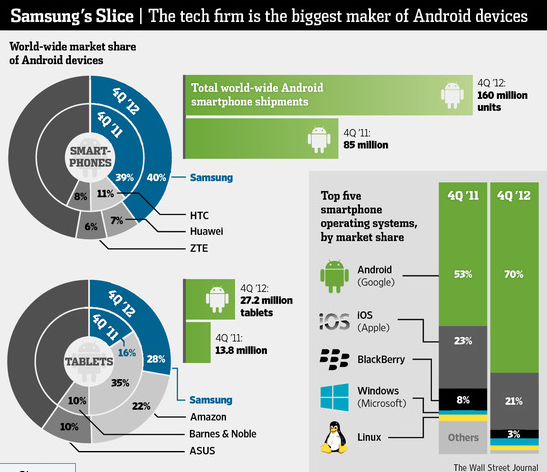Samsung’s global domination of the Android platform is, on the one hand a testimony to the strength of both Android and Samsung together. On the other hand, it’s leading Google execs to worry that Samsung’s lions share of the Android market (about 40%) could lead to Samsung renegotiating their contract with Google and leveraging their market share to do so. For its part, Google is taking meetings this week during Mobile World Congress in Barcelona with other Android OEM partners to help keep Samsung’s leverage in check. Google wants legitimate competition from the likes of HTC and even HP.
Google’s Android chief Andy Rubin has publicly praised Samsung’s success with the Android platform and their more than 213 million shipped Android devices have helped boost Google’s own mobile-ad revenue. However, Rubin is equally concerned that Samsung could become too large for Google’s own good, which is leading many to believe is the reason for Google’s pursuit of Motorola. Google’s concern isn’t unfounded as recent analytics show Samsung has grabbed 39.6% of the global Android market. Samsung’s biggest competition isn’t even another Android manufacturer, it’s Apple and their 136.8 million iPhones shipping in 2012 leading to 25.1% of the smartphone market.
The bottom line for Google is their fear that Samsung will begin to demand a greater share of online-advertising revenue that Google generates and is Google’s biggest revenue source. In the past Samsung has received 10% of the mobile-ad revenue, but Samsung has signaled to Google that eventually it will want more. Samsung could take the opportunity to press Google and use its market share dominance to receive “better versions of Android software before other manufacturers.”
It’s these concerns out of Google that leads us to Motorola and the opportunity Google has to produce hardware in-house in a similar fashion to how Apple produces the iPhone. With total control of the hardware and software, Google could make superior devices. However, that also leads to concerns that such a move would alienate alternative Android manufacturers and Google has promised not to show Motorola favoritism. If Motorola’s “X-Phone” is in fact a real device and if its purpose is to directly compete with flagship devices like the iPhone and Galaxy series, Google could begin moving toward reducing Samsung’s leveraging power while still maintaining Android’s superiority.
So just how powerful is Samsung in all of this? Well, take a look at this Strategy Analytics infographic below showing Samsung’s 213,000,000 million phones sold last year. That’s more than the total population of Brazil, so just think about that for a minute. With the release of the Galaxy Note 8.0, Galaxy S IV in two weeks and eventually the Galaxy Note III later this year, Samsung is poised to continue taking over the smartphone world.

